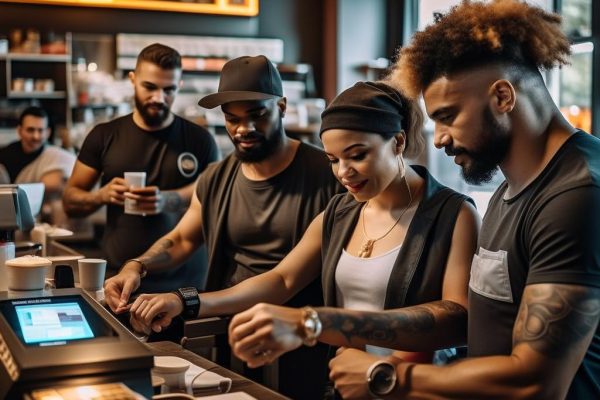Ever since the advent of Bitcoin in 2009, blockchain technology has steadily permeated different sectors, from banking to supply chain management, and even to real estate. Yet, few predicted its penetration into the hospitality industry, especially the restaurant business.
Restaurants typically face a myriad of financial challenges, including cash flow management, high operating costs, and unstable payment processing systems. The recent global pandemic amplified these issues, putting the future of many businesses at risk. However, through blockchain technology and cryptocurrencies, many restaurant owners are finding solutions to these pressing problems.
Cryptocurrencies and Payment Processing: The End of High Fees
For any restaurant, payment processing can be a pain point. Traditional banking systems often come with significant transaction fees and sometimes unreliable service. However, integrating cryptocurrency as a payment method significantly alleviates these issues.
Restaurants using cryptocurrencies can bypass traditional banking institutions and their associated fees. This allows for a lower cost of doing business and ensures a more reliable transaction system[1]. Additionally, crypto transactions are faster, thus improving the cash flow in these businesses.
[1] https://www.federalreserve.gov/econres/feds/files/2018070pap.pdf
For example, a restaurant chain in the UK, Brewdog, has been accepting Bitcoin as a mode of payment since 2018. By 2023, Brewdog reported a decrease in payment processing fees by 60%.
Supply Chain Management: Transparency and Efficiency Through Blockchain
Another significant challenge for restaurant businesses is the management of supply chains. Blockchain technology offers solutions through enhanced transparency and efficiency.
By integrating blockchain into supply chains, restaurants can accurately track their products from the farm to the table. This transparency can be used to assure customers about the quality of the food, and also enables restaurants to manage their inventory more efficiently.
Bumble Bee Foods, a seafood company, for instance, uses blockchain technology to provide complete transparency to its customers. Restaurants partnering with such suppliers can leverage this technology to ensure quality control and enhance customer trust.
Crypto Adoption: Attracting a New Customer Base
Beyond solving financial constraints, adopting cryptocurrencies can attract a new breed of customers: the crypto community. Restaurants accepting digital currencies like Bitcoin, Ethereum, or Dogecoin often attract patrons who prefer to transact in these mediums. This offers an additional advantage to restaurants in terms of increasing their customer base.
The Future of Restaurants: Decentralized Finance (DeFi)
As the crypto ecosystem evolves, new innovations like decentralized finance (DeFi) have emerged. DeFi could potentially offer restaurants access to loans, savings, and insurance without the need for traditional banks. This means restaurants can secure loans for expansion or handle unexpected costs without dealing with stringent bank regulations.
In Conclusion: A Fresh Serving of Financial Innovation
The adoption of cryptocurrencies and blockchain technology is no longer a futuristic concept, but a present-day solution that is resolving financial constraints in the restaurant industry. As this digital wave sweeps across different sectors, businesses that adopt early stand to benefit the most.
While it might not be the panacea for all financial issues, the crypto ecosystem undoubtedly offers innovative solutions that can help transform the restaurant industry. The future, as it seems, is on the blockchain.
FAQs
What are crypto ecosystems?
Crypto ecosystems are digital networks built on blockchain technology. They include cryptocurrencies like Bitcoin and Ethereum, as well as DeFi (Decentralized Finance) platforms, Dapps (Decentralized Applications), and NFTs (Non-Fungible Tokens). They’re trustless, borderless, and open 24/7!
How do these ecosystems solve financial constraints in the restaurant business?
Crypto ecosystems unlock new financial tools, mate. They provide instant cross-border payments with less fees, introduce novel fundraising methods like ICOs (Initial Coin Offerings) or IEOs (Initial Exchange Offerings), and enable access to DeFi loans. Talk about a feast of financial solutions!
What is a DeFi loan?
DeFi loans, short for Decentralized Finance loans, are crypto’s way to make borrowing and lending as easy as ordering your favorite grub. They’re peer-to-peer, completely transparent, and don’t need a middleman like banks. You just lock your crypto as collateral and get the dough!
How does ICO help the restaurant business?
With an ICO, or Initial Coin Offering, restaurants can crowdfund by selling their own token before launch. Investors buy the tokens hoping that the restaurant thrives and the token’s value moons. Imagine it as buying gift cards for a yet-to-open eatery!
How can crypto improve cross-border transactions for restaurants?
Cross-border transactions in crypto are fast, secure, and cheap – like a bargain meal! They bypass traditional banking systems, avoid high fees, and can happen 24/7. It’s like sending money as easy as sending a text!
What are the risks for restaurants adopting crypto ecosystems?
The main risks are market volatility and regulatory uncertainty. Crypto prices can swing like a wild salsa dance, and the legal landscape is always evolving. So it’s like experimenting with a new recipe – it could be a hit or miss!
Can restaurants create their own cryptocurrencies?
Absolutely! Restaurants can issue their own tokens. These “foodcoins” can be used for loyalty rewards, special discounts, or access to exclusive events. It’s like having your own digital loyalty card, but it can be traded or sold!
What is the role of NFTs in the restaurant business?
NFTs, or Non-Fungible Tokens, can be a game-changer for restaurants. They can represent unique digital or physical items – like a VIP dinner experience or a recipe. They’re your golden ticket to the culinary world, but on the blockchain!
Can customers pay for their meals with crypto?
Sure thing! More and more restaurants are accepting cryptocurrencies as payment. You can pay for your meal in Bitcoin, Ethereum or even Dogecoin. It’s like paying with your credit card, but with crypto, and it’s faster and more secure!
Can restaurants offer loyalty rewards in crypto?
Yeah, they can! With tokenization, restaurants can offer crypto tokens as loyalty rewards. Customers can hodl these tokens, trade them, or even use them to pay for future meals. It’s like frequent flyer miles, but tastier!
Is it legal for restaurants to adopt cryptocurrencies?
Depends on where you are, mate! While crypto is legal in many places, the regulation differs from country to country. It’s important to stay updated and seek legal advice. Think of it as checking health and safety rules, but for finance!
How secure is adopting crypto for restaurant business?
Crypto transactions are secured by blockchain tech, making them tamper-proof. However, like handling raw chicken, you gotta be careful! Crypto wallets can be vulnerable to hacking if not properly secured. Always use a trusted wallet and keep your private keys safe.





